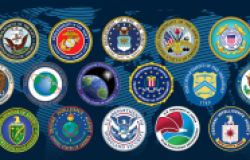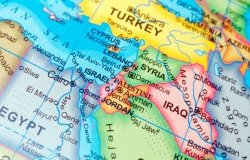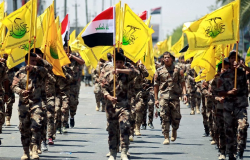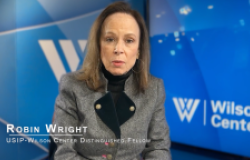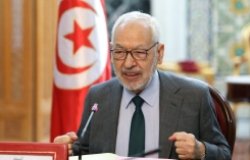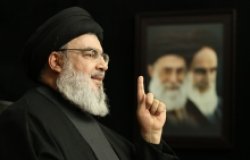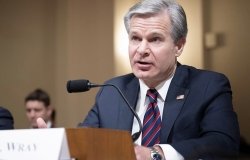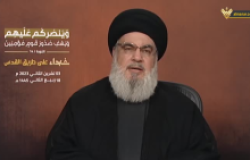NATO to Join Anti-ISIS Coalition
On May 25, NATO Secretary General Jens Stoltenberg confirmed that the alliance will officially join the Global Coalition to Defeat ISIS. In a statement before a NATO summit, Stoltenberg said that the move “will send a strong political message of NATO’s commitment to the fight against terrorism and also improve our coordination within the coalition.” He also underlined, however, that NATO will not engage in direct war or combat operations. The complete statement and remarks on NATO’s role in the fight against ISIS are below.
NATO will join anti-IS coalition at Trump summit: Stoltenberg https://t.co/OUlc0rSLxTpic.twitter.com/Di3nmvMNNB
— FRANCE 24 (@FRANCE24) May 25, 2017
NATO Secretary General Jens Stoltenberg Doorstep Statement:
“In a few hours, NATO leaders will gather here in Brussels for an important meeting at our new Headquarters.
We have two major items on our agenda: Stepping up NATO’s role in the fight against terrorism and fairer burden sharing in our Alliance. We are making progress on both. NATO has been actively engaged in the fight against terrorism for many years. Today, we will adopt an action plan to enhance NATO’s contributions. Our largest military operation ever was launched in Afghanistan in a direct response to the 9/11 terrorist attacks on the United States. 13,000 NATO troops continue to train Afghan forces. We will assess our level of support and the future of the mission. Training local forces is one of the best weapons in the fight against terrorism. We are already training Iraqi forces. And our AWACS surveillance planes provide information to the Global Coalition to Defeat ISIS. Today, we will decide to expand our support to the Coalition. With more AWACS flight-time, more information sharing and air-to-air refueling. All 28 Allies are members of the Global Coalition and today, we will agree on NATO’s membership in the Coalition. This will send a strong political message of NATO’s commitment to the fight against terrorism. And improve coordination within the Coalition. But it does not mean that NATO will engage in combat operations.
At the same time, we will agree to establish a new terrorism intelligence cell here at NATO headquarters. Improving how we share intelligence, including on foreign fighters. And we will decide to appoint a coordinator to oversee NATO’s efforts in the fight against terrorism.
The other major topic we will discuss is fairer burden sharing. In 2014, all Allies agreed to spend more and better on defence. Including moving towards investing 2 percent of GDP on defence within a decade. In 2015, cuts came to a stop. And in 2016, total spending across Europe and Canada increased by billions of dollars. This is not just about cash. But also modern capabilities. And meaningful contributions to NATO’s missions, operations and engagements. Today, we will take steps to keep up the momentum. We will agree to develop national plans every year. These will set out how NATO Allies intend to meet their pledge. So that we continue to match words with action.
The stakes are high. This is about our security in a more uncertain world. So I look forward to welcoming all NATO leaders, as well as the Prime Minister of Montenegro, soon to be our 29th Ally.
With that, I’m ready to take your questions.”
NATO Secretary General Jens Stoltenberg Remarks:
“We will agree an Action Plan today on how to step up NATO’s efforts fighting terrorism. And in that Action Plan, there are many elements. One of the elements is to join the Global Coalition fighting ISIS. This will send a strong political signal, a strong signal and message of unity in the fight against terrorism, but also provide a better practical platform for coordination on NATO efforts and the efforts of the rest of the Coalition. We are going to step up our practical support with more AWACS support, more flying time and more information sharing and air-to-air refueling. We will also do more when it comes to other issues. I announced that we will now establish a new intelligence fusion cell at the headquarters addressing terrorism, including foreign fighters. And we will also appoint a special coordinator for NATO’s efforts fighting terrorism. So this is both a strong political message of unity in the fight against terrorism, but also a part of an Action Plan where we are providing more practical support to the efforts fighting global terrorism, including addressing our mission in Afghanistan.”
“We are just establishing a new intelligence division here at the headquarters so we can better analyze, better understand and better share intelligence. And we are also today announcing that we will establish a new fusion cell related to fighting terrorism, especially addressing also issues such as foreign fighters. So this is an area where NATO really plays a key role, enabling Allies to share intelligence, also related to fighting terrorism.”
“NATO will continue its train, assist, and advise mission in Afghanistan. And we will address that during the meeting today. We will also later on this year decide on the exact troop levels. We will not return back to a combat operation. Our aim is to train the Afghan forces to enable them to step up their efforts in stabilizing their own country, countering the Taliban, but also fighting different terrorist groups in Afghanistan, including ISIS. And again we have seen that Afghan forces, the special operations forces have been very effective in targeting and attacking ISIS and other terrorist groups in Afghanistan. NATO troops are not doing that, but we help and we train and advise Afghans in their fight against ISIS.”
“NATO joining the Coalition to Defeat ISIS is a strong political message of unity in the fight against terrorism. It additionally provides a better platform for coordinating the efforts of NATO and other Coalition members in the fight against ISIS. And NATO is also stepping up our practical support by more AWACS support, our surveillance planes improving the air picture for Coalition planes, with more flying hours, with more information sharing and also with air-to-air refueling. And then we will also do more directed to intelligence. We are establishing a new intelligence cell here at the NATO headquarters, which also enables us to get more information about foreign fighters, and I will appoint a special coordinator for overseeing NATO’s efforts in the fight against terrorism. So joining the Coalition is both a strong political message and a practical tool to improve the way we coordinate our efforts to defeat ISIS.”
“NATO is an Alliance which exists to preserve peace and to create stability. And also to help create stability beyond our borders, because when our neighbors are more stable, we are more secure. Therefore, NATO supports efforts to find political solutions, peaceful solutions, negotiated solutions to the different conflicts we see around in the Middle East and the Arab world. Sometimes it’s also necessary to use military means. And then NATO and NATO Allies have also shown that they’re willing to do that, as NATO Allies do now in Syria and Iraq fighting ISIS, and also supported by NATO. But in the long-run the aim is of course to find peaceful, negotiated solutions. [inaudible] We believe strongly that we have to be able to move forward to avoid the turmoil and violence we see in many parts of the Middle East.”
Related Program

The Islamists
Learn more about Hamas and how it relates to similarly aligned organizations throughout the region. Read more


